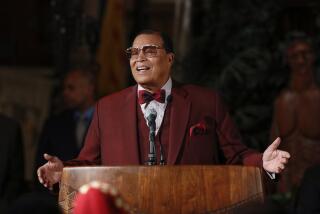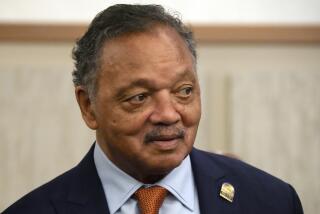Top Black Leaders Pledge Closer Cooperation With Farrakhan
- Share via
WASHINGTON — In a quest for greater racial solidarity, the nation’s top black leaders Thursday embraced controversial Nation of Islam minister Louis Farrakhan as a full partner in the effort to improve the lives of African-Americans and vowed to work more closely with him.
The occasion was a Congressional Black Caucus-sponsored, town hall-style meeting titled “Race in America.”
It was attended by some of the country’s most prominent black men and women, including the Rev. Jesse Jackson, NAACP Executive Director Benjamin F. Chavis Jr. and Rep. Maxine Waters (D-Los Angeles).
Farrakhan, an advocate of racial separatism who has been accused of making anti-Semitic remarks, played a prominent role in the proceedings and many of his followers attended.
In declaring the partnership, the Congressional Black Caucus and the Nation of Islam agreed to consult each other on legislative matters and in developing strategies aimed at finding solutions to problems facing the black community.
Chavis, newly named to his post, said black leaders had erred in excluding Farrakhan from speaking at the recent 30th Anniversary March on Washington.
Rep. Kweisi Mfume (D-Md.), chairman of the Black Caucus, said the newly enlarged group of lawmakers now will cooperate with the Nation of Islam just as it does with the NAACP and Jackson’s Rainbow Coalition.
“No longer will we allow people to divide us anyplace, anywhere, in any way,” Mfume said at the conclusion of a panel discussion by Farrakhan, Jackson, Chavis and Waters.
Waters suggested that the atmosphere created by the Middle East peace agreement between Israel and the Palestine Liberation Organization might have contributed to the growing acceptance of Farrakhan by mainstream civil rights groups.
“I think the coming together of (Yasser) Arafat and (Yitzhak) Rabin sent a strong signal,” Waters said after the panel session. “I think we’re in a new phase--a new environment.”
Rep. Bobby L. Rush (D-Ill.), whose Chicago district includes Farrakhan’s headquarters, called the rise of the black Muslim’s influence a healthy development for African-Americans.
“It was a very important moment--black leadership from a broad spectrum, coming together and discussing the problems facing the black community, showing a common purpose despite differences,” Rush said.
Despite the display of unity, however, there were obvious differences among the panelists.
Farrakhan suggested at one point that black leaders in the schools, churches and politics are out of touch with their constituents.
“Most of our leaders are handpicked by the very enemies we are fighting,” Farrakhan said as he questioned the goals of racial integration long advocated by the NAACP and Jackson’s organization.
He asked: “Should we close black hotels so we can sleep in white hotels?”
The panelists agreed that the black community is in desperate need of solutions to its problems, with “fratricide” among young blacks and widespread unemployment chief among them. But they differed on how best to confront the issues.
More to Read
Sign up for Essential California
The most important California stories and recommendations in your inbox every morning.
You may occasionally receive promotional content from the Los Angeles Times.













